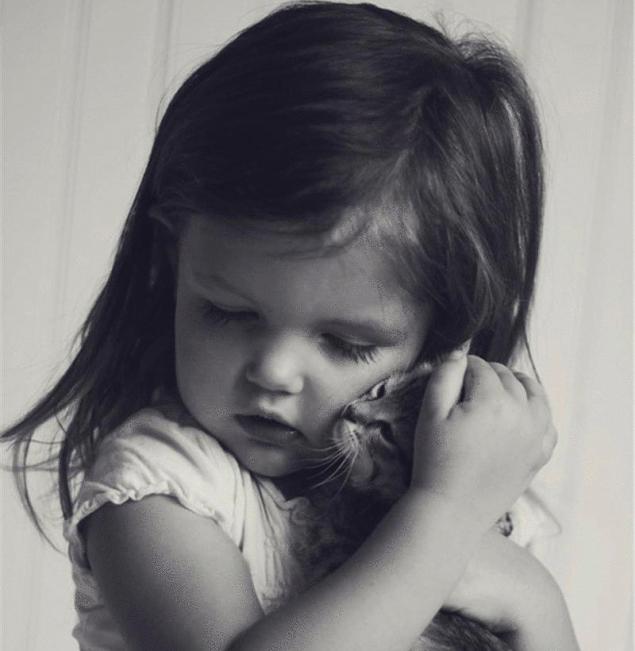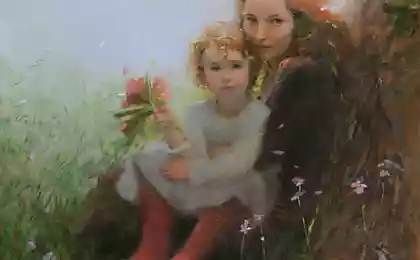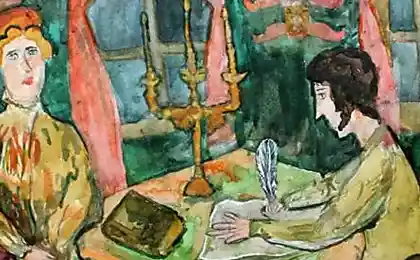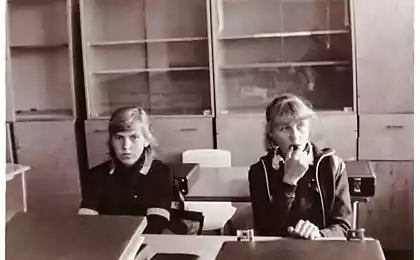179
What is behind the usual parental phrases
Each of these phrases is spelling, parental "black magic." As we know from fairy tales, either the one who cast the spell, or the more powerful magician, can wizard. Sometimes it takes years to find a more powerful magician. We have time to “excel” our children and give them the opportunity to develop, because their potential is important.
I want my child to stay so small forever. I want him to always be so sweet. ?
We send a signal to the child’s subconscious mind: “Do not grow!” When you are young, you are loved and safe. ?
What threatens: either infantilization, developmental delay, small height - weight, fear of growing up, fear of letting go of parents, fear of loneliness, dependence, withdrawal to the fantasy world, withdrawal to "childhood diseases", or vice versa - earlier adulthood, early separation, rudeness, aggression ...
Sorcery: words spoken aloud or to oneself.
“I rejoice in your every day. And every year of growing up. I'm proud of your every move. And I let you be different. You're the best kid for me. And I celebrate every day. Every age gives you a gift.
When a parent's speech often sounds pronoun "We". (After the child said “I” about himself.)When a parent says of a child over 4, “we pooped, we went to kindergarten, we went to school, we got sick, we got married.” The pronoun “we” indicates that the parent does not feel the child apart from himself. And subconsciously does not allow the child to separate and separate. It is the parent that creates the ground for the co-dependence of the child. It does not allow the child to feel his own potential. Often, the parent who does not have “its own meaning”, its realization, is realized in the child. Often an anxious and very controlling parent tries to keep the child under the wing.
What threatens: the child becomes either obligingly comfortable, or stubborn and aggressive, not independent, not collected, can often get sick, cry, it is difficult for him to make a decision on his own, can often look tired, such children have frequent allergic reactions and protracted bronchitis. (By not letting the child go into his or her self, we shift the burden of our tasks, difficulties, illnesses onto him or her—this can be an excessive burden for the child.)
Adults draw (sculpt) separately from themselves, separately from the child. Ask yourself, “What did I dream about, what can I do for myself and my potential?” :
“You are you. I am me. We are together, we are forever a parent and a child, you are forever my son – a daughter, but we are different. Each of us has our own potential, our own tasks, our own life and destiny. ?
When we talk about children, my man, my woman.We create confusion in roles. Make your child your “partner.” Instead of a real adult partner.
What threatens: we create a bundle - mother-son, father-daughter. Depriving the child of the opportunity to then create a harmonious pair (parents are not cheated, either - they flee from them, or - then they look for a mother or father all their lives). We put the child on a step next to us, and on this step the tasks of another level. She has a lot of sexual energy, too. A child with this role-energy may not be able to cope - excessive masturbation is one of the "symptoms." We alienate the husband - the wife, or do not allow a partner - an adult man and an adult woman to appear next to us.
Conspiracy: Focus the relationship on the adult partnership, the couple. Show "visible" signs of attention and respect for his wife, husband. It is important that the child addressed the parents not just by name, but also called the role of “mother”, “dad”. The child can say mentally or out loud:
“You are my beloved son, I am your mother.” And this is my man, my husband. (My wife, my wife). You will surely have a man (woman) that you will love and be happy with. And I'll be happy for you.
“What a bad table chair – hit the child, let’s punish him.When a child stumbles, hits furniture, benches, parents sometimes, to move attention and give “compensation” for the pain – offer “revenge” – to return the pain, hit the “offender”.
Threatening: This is how we teach children not to take responsibility for their actions and shift the blame. And take revenge on “external” objects for any discomfort. Nor do we teach a child healthy care and attentiveness.
Sorcery: Let me kiss, stroke, blow. Mom (Dad) is with you! It must hurt a lot. Touch the table, you hit a corner.
Look, here's the corner. Let's be careful.
You will be the greatest physicist, dancer.What threatens: we create in the child the ground for the development of neurosis and perfectionism. The child will either try to meet the expectations of the parent, he will be an excellent student, an activist. But it will do so in order not to lose our attention and love and will lose contact with the natural joy and vitality. Or – a child with obstacles or comparison with others can become disappointed in himself and his abilities “I still will not work” and look for safety – in fantasy, computer, TV, diseases, addictions.
Conjuring: take care of their development, so as not to realize in the child what they could not realize themselves, instead of the words “I love you for”. Say, "I love you." Or just talk about love more often.
"I'm glad I have you."
It’s important to talk about your mistakes, tell funny stories about yourself, let your child make mistakes, and focus more on the process than the outcome.
“We’re great when we like what we do.”
Words that you can say out loud or to yourself:
"I love you. And you will forever be my beloved son, daughter. You don't need to deserve my love. I believe in your potential and trust your natural wisdom. I believe that everyone has their place in life, in the family, everyone has their own place in realization and success, and you will take your own place. I will support you in your development. I agree that you can choose your own path. I let you be yourself.
You look like your dad.We tend to look for similar traits in children. It is important for us to “continue” in our children. But sometimes we create prerequisites for “growing” in ourselves not only appearance, but also qualities, diseases of adults.
What threatens: the child “merges” with the parent, the “similarity” with which is constantly emphasized. It is as if we were “dedicating” it to this adult. The child may agree to be a copycat, or may try to resist it. In the first case, he adopts traits of character, reactions, sometimes diseases, gets into similar situations. He is identified with someone with whom the similarity is emphasized. In the second, he can demonstratively avoid contact, behave aggressively, and abandon the truly mature traits that are characteristic of both.
Witchcraft:
“You are similar, but you are different. Each of you has your own destiny, your own strength, your own potential. You've taken the most precious of the two births, and you actually look like yourself. You have a right to be yourself. ?
When you have children of your own, you will understand.There is a hidden threat in this phrase. It is not specific, refers to passive-aggressive phrases - for the subconscious of the child sounds like a curse.
“You will pay for everything I have gone through with you.”
Interestingly, working with clients with psychological infertility, this phrase is often extracted from their memory.
What threatens: a feeling of guilt, fear of having children, a feeling that is bad and that I made a mistake, but it is not clear what, I was wrong.
Witchcraft: Talking about your parenting feelings: I'm angry, I'm hurt, I'm hurt.
“I love you whenever we’re having fun, when we’re having trouble with each other, when you’re healthy and when you’re sick, when you’re hurting and when we’re mad at each other. And I think you're going to be a wonderful mom. My love for you will be passed on to your children, to my grandchildren. ? published
P.S. And remember, just by changing our consumption – together we change the world!
Source: flymama.info/kids/neskolko-roditelskix-fraz-lyubov/
I want my child to stay so small forever. I want him to always be so sweet. ?

We send a signal to the child’s subconscious mind: “Do not grow!” When you are young, you are loved and safe. ?
What threatens: either infantilization, developmental delay, small height - weight, fear of growing up, fear of letting go of parents, fear of loneliness, dependence, withdrawal to the fantasy world, withdrawal to "childhood diseases", or vice versa - earlier adulthood, early separation, rudeness, aggression ...
Sorcery: words spoken aloud or to oneself.
“I rejoice in your every day. And every year of growing up. I'm proud of your every move. And I let you be different. You're the best kid for me. And I celebrate every day. Every age gives you a gift.
When a parent's speech often sounds pronoun "We". (After the child said “I” about himself.)When a parent says of a child over 4, “we pooped, we went to kindergarten, we went to school, we got sick, we got married.” The pronoun “we” indicates that the parent does not feel the child apart from himself. And subconsciously does not allow the child to separate and separate. It is the parent that creates the ground for the co-dependence of the child. It does not allow the child to feel his own potential. Often, the parent who does not have “its own meaning”, its realization, is realized in the child. Often an anxious and very controlling parent tries to keep the child under the wing.
What threatens: the child becomes either obligingly comfortable, or stubborn and aggressive, not independent, not collected, can often get sick, cry, it is difficult for him to make a decision on his own, can often look tired, such children have frequent allergic reactions and protracted bronchitis. (By not letting the child go into his or her self, we shift the burden of our tasks, difficulties, illnesses onto him or her—this can be an excessive burden for the child.)
Adults draw (sculpt) separately from themselves, separately from the child. Ask yourself, “What did I dream about, what can I do for myself and my potential?” :
“You are you. I am me. We are together, we are forever a parent and a child, you are forever my son – a daughter, but we are different. Each of us has our own potential, our own tasks, our own life and destiny. ?
When we talk about children, my man, my woman.We create confusion in roles. Make your child your “partner.” Instead of a real adult partner.
What threatens: we create a bundle - mother-son, father-daughter. Depriving the child of the opportunity to then create a harmonious pair (parents are not cheated, either - they flee from them, or - then they look for a mother or father all their lives). We put the child on a step next to us, and on this step the tasks of another level. She has a lot of sexual energy, too. A child with this role-energy may not be able to cope - excessive masturbation is one of the "symptoms." We alienate the husband - the wife, or do not allow a partner - an adult man and an adult woman to appear next to us.
Conspiracy: Focus the relationship on the adult partnership, the couple. Show "visible" signs of attention and respect for his wife, husband. It is important that the child addressed the parents not just by name, but also called the role of “mother”, “dad”. The child can say mentally or out loud:
“You are my beloved son, I am your mother.” And this is my man, my husband. (My wife, my wife). You will surely have a man (woman) that you will love and be happy with. And I'll be happy for you.
“What a bad table chair – hit the child, let’s punish him.When a child stumbles, hits furniture, benches, parents sometimes, to move attention and give “compensation” for the pain – offer “revenge” – to return the pain, hit the “offender”.
Threatening: This is how we teach children not to take responsibility for their actions and shift the blame. And take revenge on “external” objects for any discomfort. Nor do we teach a child healthy care and attentiveness.
Sorcery: Let me kiss, stroke, blow. Mom (Dad) is with you! It must hurt a lot. Touch the table, you hit a corner.
Look, here's the corner. Let's be careful.
You will be the greatest physicist, dancer.What threatens: we create in the child the ground for the development of neurosis and perfectionism. The child will either try to meet the expectations of the parent, he will be an excellent student, an activist. But it will do so in order not to lose our attention and love and will lose contact with the natural joy and vitality. Or – a child with obstacles or comparison with others can become disappointed in himself and his abilities “I still will not work” and look for safety – in fantasy, computer, TV, diseases, addictions.
Conjuring: take care of their development, so as not to realize in the child what they could not realize themselves, instead of the words “I love you for”. Say, "I love you." Or just talk about love more often.
"I'm glad I have you."
It’s important to talk about your mistakes, tell funny stories about yourself, let your child make mistakes, and focus more on the process than the outcome.
“We’re great when we like what we do.”
Words that you can say out loud or to yourself:
"I love you. And you will forever be my beloved son, daughter. You don't need to deserve my love. I believe in your potential and trust your natural wisdom. I believe that everyone has their place in life, in the family, everyone has their own place in realization and success, and you will take your own place. I will support you in your development. I agree that you can choose your own path. I let you be yourself.
You look like your dad.We tend to look for similar traits in children. It is important for us to “continue” in our children. But sometimes we create prerequisites for “growing” in ourselves not only appearance, but also qualities, diseases of adults.
What threatens: the child “merges” with the parent, the “similarity” with which is constantly emphasized. It is as if we were “dedicating” it to this adult. The child may agree to be a copycat, or may try to resist it. In the first case, he adopts traits of character, reactions, sometimes diseases, gets into similar situations. He is identified with someone with whom the similarity is emphasized. In the second, he can demonstratively avoid contact, behave aggressively, and abandon the truly mature traits that are characteristic of both.
Witchcraft:
“You are similar, but you are different. Each of you has your own destiny, your own strength, your own potential. You've taken the most precious of the two births, and you actually look like yourself. You have a right to be yourself. ?
When you have children of your own, you will understand.There is a hidden threat in this phrase. It is not specific, refers to passive-aggressive phrases - for the subconscious of the child sounds like a curse.
“You will pay for everything I have gone through with you.”
Interestingly, working with clients with psychological infertility, this phrase is often extracted from their memory.
What threatens: a feeling of guilt, fear of having children, a feeling that is bad and that I made a mistake, but it is not clear what, I was wrong.
Witchcraft: Talking about your parenting feelings: I'm angry, I'm hurt, I'm hurt.
“I love you whenever we’re having fun, when we’re having trouble with each other, when you’re healthy and when you’re sick, when you’re hurting and when we’re mad at each other. And I think you're going to be a wonderful mom. My love for you will be passed on to your children, to my grandchildren. ? published
P.S. And remember, just by changing our consumption – together we change the world!
Source: flymama.info/kids/neskolko-roditelskix-fraz-lyubov/
Empathy with Christ - what to do if you can not be in the temple on Easter
The rehabilitation of the soul - Holy Saturday: the ocean of meaning
























